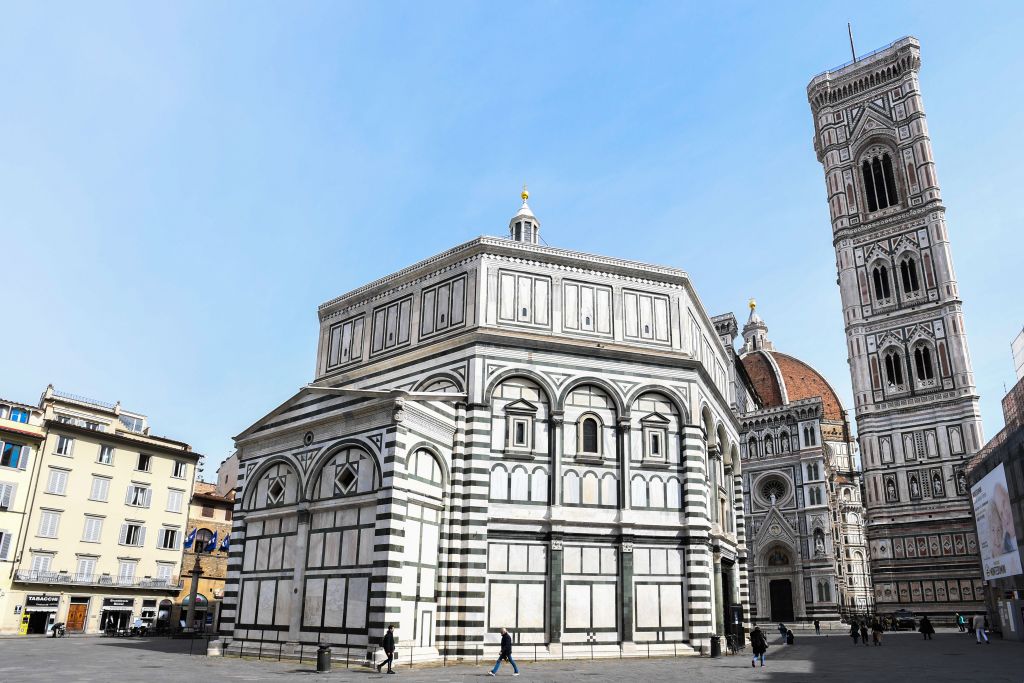The trouble with Florence, says Ricardo, a local journalist, is that we’re just living off our past glories. “Aren’t we all?” I reply.
Florence could perhaps be forgiven when it has accumulated such vast cultural and physical capital, built up over centuries. Signs remind you that it’s 700 years since the death of its most famous son, Dante, father of the Italian language. I must admit I’ve always been too intimidated to read his epic, The Divine Comedy, which T.S. Eliot said was “as great as poetry ever gets.” To prepare for my assault on the summit, I have been reading about Dante himself. I hadn’t known he had no more than a passing acquaintance with his great love, Beatrice. He met her once as a child and then passed her in the street a few times before she died at the age of 25. Yet she is the subject of many of Dante’s most intense verses, in The Divine Comedy and elsewhere. His wife, Gemma, on the other hand, who bore his four children and managed the family business, gets not a word. If I was her, looking down from Heaven, I’d feel pretty cheesed off.
History seeps from the walls here. My morning commute by bike takes me past the Palazzo Vecchio, the magnificent castle that’s still Florence’s seat of government. I bump over cobblestones where the mad monk Savonarola had his Bonfire of the Vanities, persuading Florentines to burn dresses, perfume, paintings, anything that might distract them from their religious duties — the painter Botticelli even burned some of his own works. Savonarola himself was later put to the torch there as a heretic. Machiavelli had an office overlooking the square and wrote about these events in The Prince. Machiavelli would certainly be canceled today.
The tourists are back in Florence and the city’s restaurants, jewelry shops and handbag sellers breathe a collective sigh of relief. At our local trattoria, a couple in their sixties from California sit down three tables away from me. They have spent one night in Venice and one night in Rome and are spending two nights in Florence. What do you think of it so far, I ask? “They need to sort out the damn parking,” the man replies. This is true.
Waiting for my starter of fioridi zucca fritti (fried zucchini flowers), I learn that they voted for Donald Trump in 2020 because of immigration and are thinking of permanently leaving the US “because of Biden.” They have bought an apartment in Portugal: they are serious. When Trump was elected in 2016, a few celebrities declared they could no longer live in the US. Could less famous Americans actually be doing this under Joe Biden?
The lady from California calls Biden “senile” and is particularly incensed that, in her view, he has curtailed American freedoms in the name of fighting Covid. She herself has refused to be vaccinated. Italy seems an odd place to come, then, as you can’t do any number of things — eat indoors at a restaurant, go to a gallery or a museum, catch an intercity train — without a certificazione verde, or green pass. To get one, you must be double vaccinated or get an expensive test that lasts only a couple of days. This vaccine militancy isn’t surprising: Italy was hit hard by coronavirus, with people dying in hospital corridors. Nevertheless, despite the fact that a green pass is required for all employees, some 20 percent of the Italian workforce, some 3.8 million people, are vaccine refuseniks — a number that seems to me extraordinarily high. Some choose to be tested constantly; my local pharmacy is booked until late December. But some workers are just staying at home. At a bus stop, we wait for the No. 7, but it never comes. A woman who’s been there an hour says there’s a shortage of drivers because so many won’t get the vaccine.
A West African man ahead of me in the line at the local tax office desperately wants to be vaccinated, otherwise he can’t work, he tells the woman at the desk. She is unmoved. To get jabbed, he must have a codice fiscale, the tax number without which you can’t open a bank account, rent an apartment or interact with officialdom. To get his codice fiscale, he needs another bit of paper from another office, but to get that he needs a codice fiscale. The rest of the queue, mostly Italians, nod in sympathy. This is the legendary Italian bureaucracy at work. I found that to obtain the sacred number you had to make an appointment online, but to make the appointment online, you needed the codice fiscal. Many of us are here in the line only because a security guard outside the building took pity on us and lent us his tax number to make the appointment. Had Dante been alive today, he would have reserved an inner circle of hell for the bureaucrats.
This article was originally published in The Spectator’s December 2021 World edition.

























